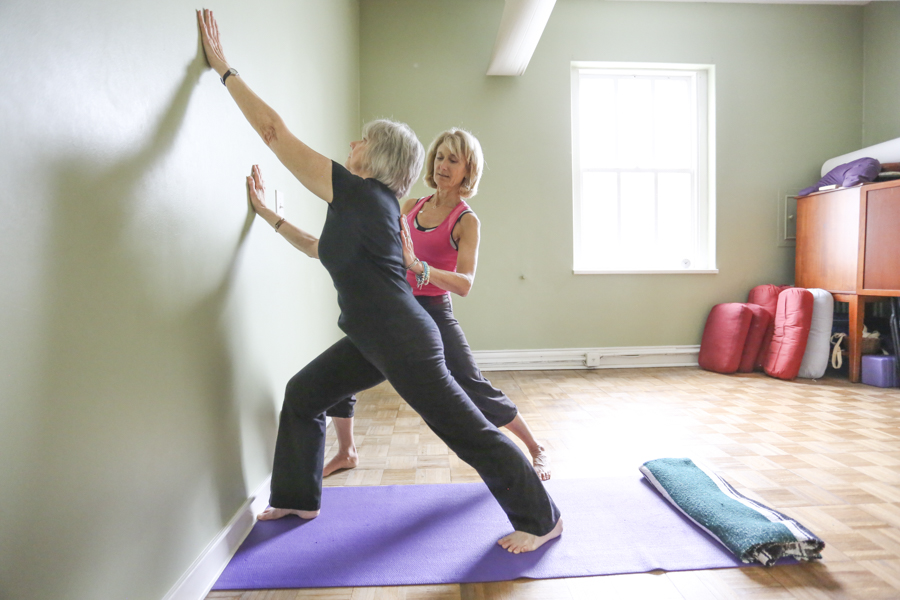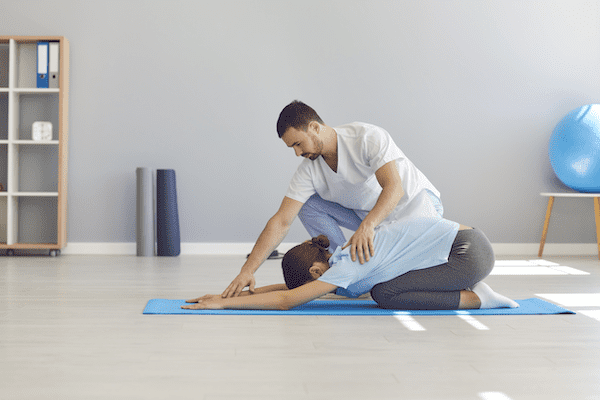Yoga Therapy
The science of yoga is a blend of ancient philosophy and modern research, with evidence-based findings supporting its effects on physical, mental, and emotional well-being. Here’s an overview of how science explains the benefits of yoga across various systems of the body:

1. Iyengar Yoga Therapy
- Focus: Alignment and precision
- Method: Uses props like belts, blocks, and blankets to assist with poses and achieve precise alignment.
- Benefits: Effective for musculoskeletal issues, chronic pain, and injuries. The slow, controlled approach also benefits beginners, elderly individuals, and those with physical limitations.
2. Vini yoga Therapy
- Focus: Adaptability and individualized practice
- Method: Stresses customized sequences and breath coordination, often involving gentle, repetitive movements.
- Benefits: Especially effective for managing chronic health conditions, like respiratory issues, arthritis, and spinal problems. Viniyoga is also helpful for stress management and emotional healing.
3. Restorative Yoga Therapy
- Focus: Deep relaxation and stress relief
- Method: Involves passive stretching with support from props to fully relax the body in each posture.
- Benefits: Targets stress reduction, burnout, and emotional healing. It’s ideal for those dealing with insomnia, anxiety, and exhaustion, as it helps reset the nervous system and induces a state of deep relaxation.
4. Kundalini Yoga Therapy
- Focus: Energy balancing and spiritual well-being
- Method: Combines postures, breathwork, chanting, and meditation to activate energy within the body (referred to as “kundalini energy”).
- Benefits: Often used for emotional healing, reducing stress, and overcoming depression or addiction. It fosters a greater connection with oneself, helping to manage trauma and spiritual growth.
5. Yin Yoga Therapy
- Focus: Connective tissue health and flexibility
- Method: Holds poses for an extended period, allowing deep tissue release and stretching, particularly in the hips, lower back, and legs.
- Benefits: Useful for improving flexibility and joint health, addressing issues like joint pain and stiffness. Yin yoga also helps in cultivating mindfulness and emotional resilience.
6. Yoga Nidra (Yogic Sleep) Therapy
- Focus: Deep relaxation and mental clarity
- Method: A guided meditation practice that takes practitioners into a state of conscious relaxation, allowing the mind and body to enter a profound state of rest.
- Benefits: Effective for insomnia, PTSD, anxiety, and stress management. Yoga Nidra provides the benefits of restful sleep and a deep sense of mental clarity, reducing fatigue and increasing focus.
7. Trauma-Sensitive Yoga Therapy
- Focus: Trauma recovery and emotional regulation
- Method: A gentle, mindful approach where poses and breathing exercises are done with an emphasis on safety and control.
- Benefits: Primarily used for individuals recovering from trauma, PTSD, or abuse. It helps reconnect the body and mind, regain a sense of safety, and establish emotional resilience.
8. Bikram and Hot Yoga Therapy
- Focus: Detoxification and strength building
- Method: A set series of 26 postures practiced in a heated room to increase flexibility, sweat out toxins, and improve cardiovascular fitness.
- Benefits: Suitable for individuals looking to increase flexibility, strengthen muscles, and detoxify. It is also helpful in managing arthritis, weight issues, and certain joint problems, although it’s not recommended for everyone due to its intensity.


9. Integrative Yoga Therapy (IYT)
- Focus: Holistic health and personalized practice
- Method: Combines elements from various yoga styles and emphasizes therapeutic benefits in alignment with medical or psychological needs.
- Benefits: Used in clinical settings, Integrative Yoga Therapy is customized for physical and mental conditions like heart disease, depression, and rehabilitation after injury or surgery.
10. Pranayama and Breathwork Therapy
- Focus: Breath regulation and energy balance
- Method: Focuses on various breathing techniques to enhance respiratory health, manage stress, and balance energy levels.
- Benefits: Effective for respiratory conditions, stress reduction, anxiety, and enhancing focus. Pranayama therapy is often used in conjunction with other therapies to deepen relaxation and mental clarity.
11. Mindfulness-Based Stress Reduction (MBSR) Yoga Therapy
- Focus: Stress reduction through mindfulness and yoga
- Method: Uses yoga and mindfulness meditation to reduce stress, manage pain, and increase emotional resilience.
- Benefits: MBSR has been scientifically studied and shown to reduce stress, anxiety, and depression. It’s particularly useful for individuals dealing with chronic pain or psychological conditions.
Each type of yoga therapy provides unique benefits, and many therapists will combine elements from different types to tailor an approach that best meets the individual’s needs. Yoga therapy has grown as a respected approach within integrative medicine, helping people achieve a holistic state of health and wellness.

